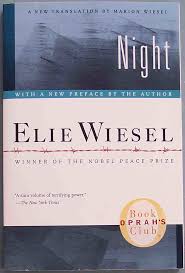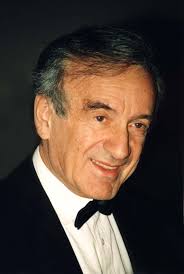Night Page #5
"Night" is a work by Elie Wiesel about his experience with his father in the Nazi German concentration camps at Auschwitz and Buchenwald in 1944–1945, at the height of the Holocaust toward the end of the Second World War. In just over 100 pages of sparse and fragmented narrative, Wiesel writes about the death of God and his own increasing disgust with humanity, reflected in the inversion of the parent–child relationship, as his father declines to a helpless state and Wiesel becomes his resentful teenage caregiver. "If only I could get rid of this dead weight ... Immediately I felt ashamed of myself, ashamed forever." In Night everything is inverted, every value destroyed. "Here there are no fathers, no brothers, no friends", a kapo tells him. "Everyone lives and dies for himself alone." Wiesel was 16 when Buchenwald was liberated by the United States Army in April 1945, too late for his father, who died after a beating while Wiesel lay silently
NIGHT. No one was praying for the night to pass quickly. The stars were but sparks of the immense conflagration that was consuming us. Were this conflagration to be extinguished one day, nothing would be left in the sky but extinct stars and unseeing eyes.There was nothing else to do but to go to bed, in the beds of those who had moved on. We needed to rest, to gather our strength. At daybreak, the gloom had lifted. The mood was more confident. There were those who said: "Who knows, they may be sending us away for our own good. The front is getting closer, we shall soon hear the guns. And then surely the civilian population will be evacuated..." "They worry lest we join the partisans..." "As far as I'm concerned, this whole business of deportation is nothing but a big farce. Don't laugh. They just want to steal our valuables and jewelry. They know that it has all been buried and that they will have to dig to find it; so much easier to do when the owners are on v a c a t i o n ... " On vacation! This kind of talk that nobody believed helped pass the time. The few days we spent here went by pleasantly enough, in relative calm. People rather got along. There no longer was any distinction between rich and poor, notables and the others; we were all people condemned to the same fate—still unknown. SATURDAY, the day of rest, was the day chosen for our expulsion. The night before, we had sat down to the traditional Friday night meal. We had said the customary blessings over the bread and the wine and swallowed the food in silence. We sensed that we were gathered around the familial table for the last time. I spent that night going over memories and ideas and was unable to fall asleep. At dawn, we were in the street, ready to leave. This time, there were no Hungarian police. It had been agreed that the Jewish Council would handle everything by itself. Our convoy headed toward the main synagogue. The town seemed deserted. But behind the shutters, our friends of yesterday were probably waiting for the moment when they could loot our homes. The synagogue resembled a large railroad station: baggage and tears. The altar was shattered, the wall coverings shredded, the walls themselves bare. There were so many of us, we could hardly breathe. The twenty-four hours we spent there were horrendous. The men were downstairs, the women upstairs. It was Saturday— the Sabbath—and it was as though we were there to attend services. Forbidden to go outside, people relieved themselves in a corner. The next morning, we walked toward the station, where a convoy of cattle cars was waiting. The Hungarian police made us climb into the cars, eighty persons in each one. They handed us some bread, a few pails of water. They checked the bars on the windows to make sure they would not come loose. The cars were sealed. One person was placed in charge of every car: if someone managed to escape, that person would be shot. Two Gestapo officers strolled down the length of the platform. They were all smiles; all things considered, it had gone very smoothly. A prolonged whistle pierced the air. The wheels began to grind. We were on our way. LYING DOWN was not an option, nor could we all sit down. We decided to take turns sitting. There was little air. The lucky ones found themselves near a window; they could watch the blooming countryside flit by. After two days of travel, thirst became intolerable, as did the heat.Freed of normal constraints, some of the young let go of their inhibitions and, under cover of darkness, caressed one another, without any thought of others, alone in the world. The others pretended not to notice. There was still some food left. But we never ate enough to satisfy our hunger. Our principle was to economize, to save for tomorrow. Tomorrow could be worse yet. The train stopped in Kaschau, a small town on the Czechoslovakian border. We realized then that we were not staying in Hungary. Our eyes opened. Too late. The door of the car slid aside. A German officer stepped in accompanied by a Hungarian lieutenant, acting as his interpreter. "From this moment on, you are under the authority of the German Army. Anyone who still owns gold, silver, or watches must hand them over now. Anyone who will be found to have kept any of these will be shot on the spot. Secondly, anyone who is ill should report to the hospital car. That's all." The Hungarian lieutenant went around with a basket and retrieved the last possessions from those who chose not to go on tasting the bitterness of fear. "There are eighty of you in the car," the German officer added. "If anyone goes missing, you will all be shot, like dogs." The two disappeared. The doors clanked shut. We had fallen into the trap, up to our necks. The doors were nailed, the way back irrevocably cut off. The world had become a hermetically sealed cattle car. THERE WAS A WOMAN among us, a certain Mrs. Schächter. She was in her fifties and her ten-year-old son was with her, crouched in a corner. Her husband and two older sons had been deported with the first transport, by mistake. The separation had totally shattered her. I knew her well. A quiet, tense woman with piercing eyes, she had been a frequent guest in our house. Her husband was a pious man who spent most of his days and nights in the house of study. It was she who supported the family. Mrs. Schächter had lost her mind. On the first day of the journey, she had already begun to moan. She kept asking why she had been separated from her family. Later, her sobs and screams became hysterical. On the third night, as we were sleeping, some of us sitting, huddled against each other, some of us standing, a piercing cry broke the silence: "Fire! I see a fire! I see a fire!"24 There was a moment of panic. Who had screamed? It was Mrs. Schächter. Standing in the middle of the car, in the faint light filtering through the windows, she looked like a withered tree in a field of wheat. She was howling, pointing through the window: "Look! Look at this fire! This terrible fire! Have mercy on me!"Some pressed against the bars to see. There was nothing. Only the darkness of night. It took us a long time to recover from this harsh awakening. We were still trembling, and with every screech of the wheels, we felt the abyss opening beneath us. Unable to still our anguish, we tried to reassure each other: "She is mad, poor w o m a n ... " Someone had placed a damp rag on her forehead. But she nevertheless continued to scream: "Fire! I see a fire!" Her little boy was crying, clinging to her skirt, trying to hold her hand: "It's nothing, Mother! There's nothing there...Please sit d o w n ... " He pained me even more than did his mother's cries. Some of the women tried to calm her: "You'll see, you'll find your husband and sons a g a i n ... I n a few d a y s ... " She continued to scream and sob fitfully. "Jews, listen to me," she cried. "I see a fire! I see flames, huge flames!" It was as though she were possessed by some evil spirit. We tried to reason with her, more to calm ourselves, to catch our breath, than to soothe her: "She is hallucinating because she is thirsty, poor w o m a n ... That's why she speaks of flames devouring h e r ... " But it was all in vain. Our terror could no longer be contained.
Translation
Translate and read this book in other languages:
Select another language:
- - Select -
- 简体中文 (Chinese - Simplified)
- 繁體中文 (Chinese - Traditional)
- Español (Spanish)
- Esperanto (Esperanto)
- 日本語 (Japanese)
- Português (Portuguese)
- Deutsch (German)
- العربية (Arabic)
- Français (French)
- Русский (Russian)
- ಕನ್ನಡ (Kannada)
- 한국어 (Korean)
- עברית (Hebrew)
- Gaeilge (Irish)
- Українська (Ukrainian)
- اردو (Urdu)
- Magyar (Hungarian)
- मानक हिन्दी (Hindi)
- Indonesia (Indonesian)
- Italiano (Italian)
- தமிழ் (Tamil)
- Türkçe (Turkish)
- తెలుగు (Telugu)
- ภาษาไทย (Thai)
- Tiếng Việt (Vietnamese)
- Čeština (Czech)
- Polski (Polish)
- Bahasa Indonesia (Indonesian)
- Românește (Romanian)
- Nederlands (Dutch)
- Ελληνικά (Greek)
- Latinum (Latin)
- Svenska (Swedish)
- Dansk (Danish)
- Suomi (Finnish)
- فارسی (Persian)
- ייִדיש (Yiddish)
- հայերեն (Armenian)
- Norsk (Norwegian)
- English (English)
Citation
Use the citation below to add this book to your bibliography:
Style:MLAChicagoAPA
"Night Books." Literature.com. STANDS4 LLC, 2025. Web. 30 Jan. 2025. <https://www.literature.com/book/night_336>.








Discuss this Night book with the community:
Report Comment
We're doing our best to make sure our content is useful, accurate and safe.
If by any chance you spot an inappropriate comment while navigating through our website please use this form to let us know, and we'll take care of it shortly.
Attachment
You need to be logged in to favorite.
Log In